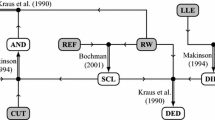Abstract
Formal nonmonotonic systems try to model the phenomenon that common sense reasoners are able to “jump” in their reasoning from assumptions Δ to conclusions C without their being any deductive chain from Δ to C. Such jumps are done by various mechanisms which are strongly dependent on context and knowledge of how the actual world functions. Our aim is to motivate these jump rules as inference rules designed to optimise survival in an environment with scant resources of effort and time. We begin with a general discussion and quickly move to Section 3 where we introduce five resource principles. We show that these principles lead to some well known nonmonotonic systems such as Nute’s defeasible logic. We also give several examples of practical reasoning situations to illustrate our principles.
Similar content being viewed by others
References
Barringer, H., D. Gabbay,and J. Woods, ‘Temporal dynamics of attack and defence networks’, in D. Hutter and W. Stephan, (eds.), Mechanising Mathematical Reasoning,in Springer Lecture Notes in Computer Science, Springer-Verlag, 2005, pp. 59–98.
Boole,G., The Laws of Thought, Cambridge: Macmillan and London, Walton and Baberly, 1854. Reprinted by LaSalle, Ill: Open Court, 1952.
Carlson Gregory N., Francis Jeffrey Pelletier (1995) The Generic Book. Chicago, Chicago University Press
de Finetti B. (1972) Probability, Induction and Statistics. New York, John Wiley
Frege, G., Begriffschrift: A Formula Language, Modeled upon that of Arithmetic for Pure Thought, in Jean van Heijenoort, (ed.), From Frege to Gödel, Cambridge, MA: Harvard University Press, 1967. Originally published in German, 1879.
Frege, G., The Foundations of Arithmetic: A Logico-Mathematical Enquiry into the Concpet of Number, translation by J. L. Austin, Oxford: Blackwell, 1978. Originally published in German, 1884.
Gabbay Dov M. (1998) Elementary Logics: A Procedural Perspective. London, Prentice-Hall
Gabbay Dov M., John Woods (2001) ‘The new logic’. Logic Journal of the IGPL 9:157–190
Gabbay Dov M., John Woods (2003) Agenda Relevance: A Study in Formal Pragmatics, volume 1 of A Practical Logic of Cognitive Systems. Amsterdam, North-Holland
Gabbay Dov M., John Woods (2003) ‘Normative models of rationality: The disutility of some approaches’. Logic Journal of IGPL 9:157–190
Gabbay, Dov M.,and John Woods, Seduction and Shortcuts: Fallacies in the Cognitive Economy,Volume 3 of A Practical Logic of Cognitive Systems, 2007, in progress.
Gabbay Dov M., John Woods (2005) The Reach of Abduction: Insight and Trial, vol. 2 of A Practical Logic of Cognitive Systems. Amsterdam, North-Holland
Gabbay Dov M., John Woods (2005) ‘The practicalturninlogic’. In: Dov M. Gabbay, Guenthner F., (ed). Handbook of Philosophical Logic, 2nd ed., 13. Dordrecht and Boston, Kluwer, pp. 15–122
Gärdenfors, P.,and D. Makinson, ‘Relations between the logic of theory change and nonmonotonic logic’, in A. Fuhrmann and M. Morreau, (eds.), The Logic of Theory Change, Springer-Verlag, 1990, pp. 185–205.
Gigerenzer Gerd (2004) ‘Fast and frugal heuristics: The tools of bounded rationality’. In: Koehler D., Harvey N., (eds). The Blackwell Handbook of Judgement and Decision-Making. Oxford, Blackwell, pp. 62–88
Hamblin C.L. (1970) Fallacies. London, Methuen
Macnamara John (1986) A Border Dispute: The Place of Logic in Psychology. Cam-bridge, MA: MIT Press
Mill, J. S., ‘A system of logic’, in J. M. Robson and J. Stillinger, (eds.), The Collected Works of John Stuart Mill, Volumes VII an VIII, Torongo University Press, 1974. Originally published in 1843 by Longman and Green, London.
Nute, D.,and C. Cross, ‘Conditional logic’, in D. Gabbay and F. Guenthener, (eds.), Handbook of Philosophical Logic, volume 4, 2nd edition, Kluwer, 2002, pp. 1–98.
Reiter R. (1980) ‘A logic for default reasoning’. AI Journal 13:81–2132
Richter, Eva, ‘Nonmonotonic inference operators for fuzzy logic’, Workshop “Uncertainty and Nonmonotonic Reasoning”, KR2002, Toulouse, 2002.
Savage L.J. (1954) The Foundations of Statistics. New York, Wiley
Scriven Michael (1987) ‘Fallacies of statistical substitution’. Argumentation, volume 1, No. 3:333–349
Woods, John, ‘Who cares about the fallacies?’, in F. H. van Eemeren, Rob Grootendorst, J. Anthony Blair and Charles A. Willard, (eds.), Argumentation Illuminated, Amsterdam: SicSat Press, 1992, pp. 22–48. Reprinted in The Death of Argument as Chapter 1.
Woods John (2004) The Death of Argument: Fallacies in Agent-Based Reasoning. Dordrecht and Boston, Kluwer
Woods John, Andrew Irvine, Douglas Walton (2004) Argument: Critical Thinking, Logic and the Fallacies, 2nd revised edition. Toronto: Prentice Hall
Woods, John, R. H. Johnson, D.M. Gabbay and H. J. Ohlbach, Logic and the practical turn, in D. M. Gabbay, R. H. Johnson, H. J. Ohlbach and J. Woods, (eds.), Handbook of the Logic of Argument and Inference: The Turn Toward the Practical, pp. 1–39. Volume 1 of Studies in Logic and Practical Reasoning, North-Holland, Amsterdam, 2002.
Author information
Authors and Affiliations
Corresponding author
Additional information
Edited by Hannes Leitgeb
Rights and permissions
About this article
Cite this article
Gabbay, D., Woods, J. Resource-origins of Nonmonotonicity. Stud Logica 88, 85–112 (2008). https://doi.org/10.1007/s11225-008-9100-2
Published:
Issue Date:
DOI: https://doi.org/10.1007/s11225-008-9100-2




